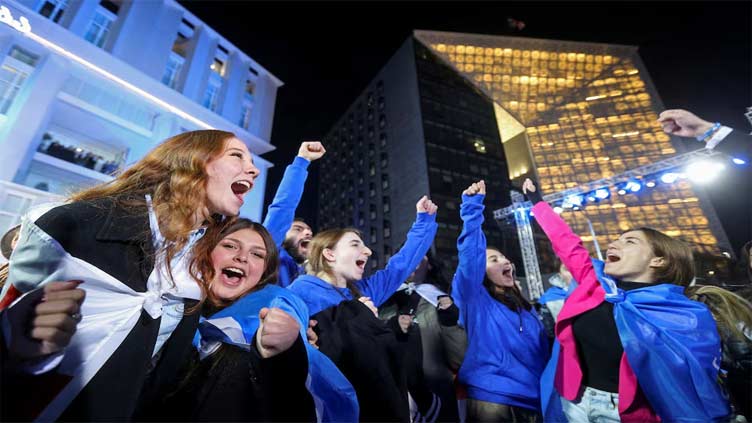Georgian ruling party wins disputed election, near-complete results show

World
The polling was marred with massive irregularities
TBILISI (Reuters) - The ruling Georgian Dream party received more than 54% of the vote in Georgia's parliamentary election on Saturday, the electoral commission said on Sunday, though the outcome was disputed by opposition parties.
The result, with over 99% of precincts counted, dealt a blow to pro-Western Georgians who had cast the vote as a choice between a ruling party that has deepened ties with Russia and an opposition aiming to fast-track integration with the European Union.
Three separate monitoring missions - the 57-nation Organisation for Security and Cooperation in Europe (OSCE); US nonprofit groups the National Democratic Institute (NDI) and the International Republican Institute (IRI); and a Georgian election monitor - all reported significant violations during Saturday's vote.
The violations, including ballot-stuffing, bribery, voter intimidation and physical violence near polling stations, could have had an impact on the results, the groups said on Sunday.
However, the three monitoring missions all stopped short of saying the elections had been stolen or falsified - claims on which opposition groups doubled down on Sunday.
"We continue to express deep concerns about the democratic backsliding in Georgia," said Antonio López-Istúriz White, head of the European Parliament's delegation to the OSCE mission.
"The conduct of yesterday's election is unfortunately evidence to that effect," he told a news briefing.
ISFED, a Georgian election monitoring group, said its observers had filed over 200 complaints to electoral authorities, although it said it had not seen significant violations in the counting of votes, most of which were tallied electronically.

The electoral commission and Georgian Dream party did not respond immediately to requests for comment on the allegations, but on Saturday both hailed a free and fair election. Georgian Dream is expected to comment on the matter later on Sunday.
Georgia's four main opposition parties said they do not recognise the results, with one opposition leader calling the results "a constitutional coup". They cited two exit polls that showed the opposition winning a majority of seats in parliament.
The leader of the United National Movement opposition party, Tina Bokuchava, said the election had been "stolen".
"My position, our position is that we definitely need protest," she told Reuters on Sunday.
But Georgian Dream's reclusive billionaire founder Bidzina Ivanishvili, who had campaigned heavily on keeping Georgia out of the war in Ukraine, claimed success on Saturday night after his party's strongest performance since 2012.
Electoral commission data showed it winning by huge margins of up to 90% in some rural areas, though it underperformed in bigger cities.
"It is a rare case in the world that the same party achieves such success in such a difficult situation - this is a good indicator of the talent of the Georgian people," Ivanishvili told cheering supporters on Saturday night.
EU MEMBERSHIP APPLICATION IN FOCUS
Ivanishvili's Georgian Dream says it wants Georgia to join the EU, though Brussels says the Caucasus country's membership application is frozen over what it says is Georgian Dream's authoritarian tendencies.
Georgian Dream pushed through a law on "foreign agents" and another curbing LGBT rights. Both drew strong criticism from Western countries but were praised by some Russian officials.
Georgia had been one of the most pro-Western countries to emerge from the Soviet Union, with polls showing many Georgians disliking Russia for its support of two breakaway regions of their country.

Russia and Georgia fought a brief war over the rebel province of South Ossetia in 2008. Georgia was defeated.
An EU official told Reuters there was "a sense of disappointment" over the Georgian opposition's performance, which set back EU expansion plans, but Brussels was primarily concerned about a contested result leading to a standoff.
The Estonian and Latvian foreign ministers both said they were concerns by reports of irregularities in the election.
One local monitoring organisation called for the results to be annulled, based on reports of voter intimidation and vote buying, but it did not immediately provide evidence of large-scale falsification.
Last week Moldova voted narrowly to approve its European Union accession in a vote that Moldovan officials said was marred by Russian interference.


